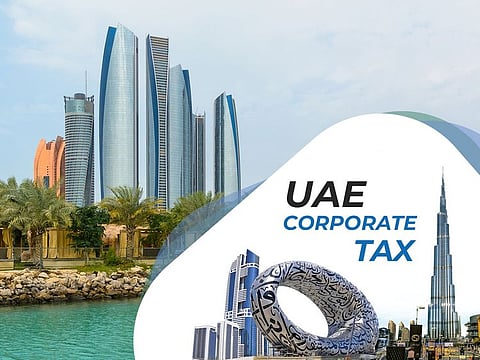On UAE Corporate Tax, free zone businesses await final word on 'qualifying income'
UAE authorities are to define 'free zone persons' who can benefit from 0% CT

Dubai: With registrations having opened for UAE’s corporate tax compliance, free zone based businesses and their owners are awaiting clarification on ’qualifying income’ for ‘free zone persons’.
The Federal Decree Law stipulates free zone persons could benefit from a 0 per cent UAE Corporate Tax on the qualifying income. “The qualifying income is to be defined in a separate Cabinet decision,” said Raju Menon, Chairman and Managing Director at the audit consultancy Kreston Menon.
Based on available guidance from the UAE Ministry of Finance, the qualifying income ‘should include offshore as well as onshore sources of income of free zone persons subject to strict conditions,” said Menon. “Hence, there should be detailed guidance forthcoming on this aspect.”
Under the UAE CT Law, free zone persons without an onshore base can transact with companies operating on the UAE mainland and benefit from 0 percent tax rate in scenarios to be specified. Such income could include 'passive income'.
The countdown has started on the process that will eventually lead to businesses in the UAE coming under a 9 per cent corporate tax regime from mid-2023. The tax rate, announced last year, ensures the UAE has one of the lowest CT regimes in the world, thus providing more incentives for businesses based here and those wanting to come in and launch.
Also Read: UAE Corporate Tax: All you need to know
The timeline for the first tax payments under the UAE Corporate Tax is on or before February 28, 2025, i.e., within nine months of the end of the first tax year from June 1, 2023 to May 31, 2024.
Who's exempt from 9% CT?
Apart from businesses engaged in extracting natural resources, government and government-controlled entities could also enjoy exemptions under the UAE Decree, but subject to eligibility criteria and conditions. The 'Free Zone Person' incentive is a substantial tax break for eligible businesses.
“Since the announcement of corporate tax in the UAE, the Federal Tax Authority has intensified its efforts, in collaboration with the competent authorities, to develop procedures to implement it in accordance with the highest standards," said Khalid Ali Al Bustani, Director-General at Federal Tax Authority in a recent statement. "And to ensure the efficiency, accuracy, and seamlessness of administrative procedures, in a way that will not impact business operations and flow.
"The Authority prioritizes supporting all business sectors to comply with tax regulations and procedures through flexible mechanisms that align with international best practices.”
Qualifying ‘free zone person’
Free zone enterprises are thus waiting keenly for the ministry’s guidance on who qualifies for the 0 per cent regime – and who doesn’t. According to the Ministry of Finance’s website, to be treated as a ‘qualifying free zone person’, the entity must:
* Maintain adequate 'substance' in the UAE;
* Derive ‘qualifying income’ as specified in a Cabinet Decision;
* Comply with 'transfer pricing' rules and maintain the relevant transfer pricing documentation; and
* Not have made an election to be subject to CT in full.
Free zone entities that meet conditions to benefit from the free zone CT regime - qualifying free zone persons – will have to pay at these rates:
* 0 per cent on qualifying income;
* 9 per cent on taxable income that does not meet the qualifying income definition.
“Any new and substantive legislation necessitates businesses to take cognizance of its applicability and plan for efficient change management,” said Menon.
Businesses should consider undertaking a deep review and documentation of revenue operations, assessing the impact of the UAE Corporate Tax, and complete requisite changes well in time of the effective date of the tax.

Apart from the qualifying income for free zone persons, “businesses in the UAE are keenly anticipating further guidance on the definition of business activities for natural persons, and the de-minimis threshold for interest capping rules.”
Incentives for small businesses
The CT is pegged at 0 per cent for taxable income up to and including Dh375,000 for small businesses.
“The federal decree does contain relief for small businesses wherein a resident taxable person generating revenue up to a threshold - to be decided by the UAE Minister of Finance - may elect to be regarded as not having derived any taxable income for the relevant tax period,” said Menon. “Accordingly, there will not be any tax cost for such small businesses.”
Carry forward of interest rate expenditure
The Federal Decree Law clarifies that net interest expenditure disallowed for a taxable person may be carried forward and deducted in subsequent 10 tax periods in the order in which such amount was incurred.
“The UAE government has been quite generous in this regard,” said Menon. “It should also be noted that the de-minimis threshold for the net interest expenditure deduction is yet to be specified by the Minister of Finance, which could further benefit businesses.”
Early registration for UAE CT
The UAE Federal Tax Authority confirmed an early registration period is available from January to May 2023 for certain categories of companies operating in the UAE. These companies will be receiving invitations from the FTA by email and SMS, allowing them to register via the EmaraTax platform. Following this, the FTA will announce when registration will be open for others. "When registration opens, priority will be given to companies and businesses that have a financial year starting on 1 June 2023," the FTA had said in a statement.
Sign up for the Daily Briefing
Get the latest news and updates straight to your inbox



